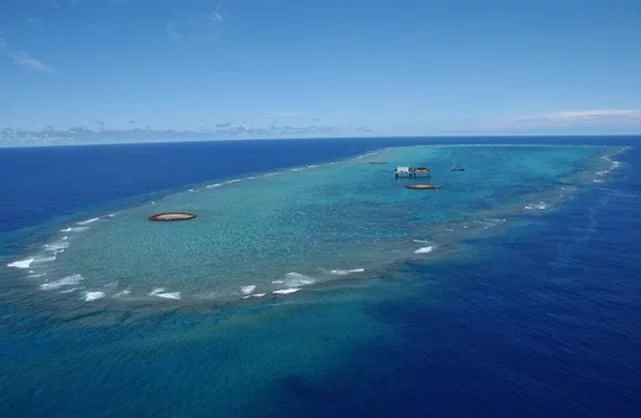
By Wang Shanning
NHK and many other Japanese media reported that a Chinese research ship conducted marine activities in waters off Okinotori, which Japanese Chief Cabinet Secretary Yoshihide Suga referred to as the "Okinotori Island" at a press conference on July 20 and claimed that its surrounding waters are Japan’s exclusive economic waters and prior consent form Japan must be obtained for activities in this area.
However, experts of Japan studies pointed out that China's normal scientific research activities do not need to notify Japan, and it is Japan that violates international law.
Lyu Yaodong, director of Foreign Affairs Teaching and Research Office of the Institute of Japanese Studies at the Chinese Academy of Social Sciences (CASS), pointed out that Japan’s protests and positions are simply untenable.
Okinotori is a group of coral rocks located in waters off southern Japan, the western Pacific Ocean, and the Philippine Sea. Article 121 of the United Nations Convention on the Law of the Sea (UNCLOS) defines an island as a naturally formed area of land, surrounded by water, which is above water at high tide. Rocks which cannot sustain human habitation or economic life of their own shall have no exclusive economic zone or continental shelf. The so-called Okinotori Island claimed by Japan is actually rocks. "The difference between island and rocks is whether it can sustain human economic life," Lyu Yaodong explained, "When the tide is high, Okinotori is submerged by seawater, only two rocks are exposed and humans cannot live on it. We must have a clear understanding of the content of the convention. Since it is just a group of rocks, Japan’s protest has no basis or reason."
Lyu believes that since this is rocks, China's normal scientific research activities on the high seas do not violate any international treaties. There is no need to notify the Japanese side, and there is no need for Japan's permission. It is Japan that violates the UNCLOS.
China, the Republic of Korea and other countries have always believed that Okinotori is a group of rocks rather than an island. The difference between words represents different ocean rights. Wang Jian, a researcher at the Institute of Modern History at the CASS, also said that five rocks of Okinotori are exposed before high tide, and only two rocks above the sea at high tide, covering only 1.6 square meters and 6.4 square meters. Since 1987, Japan has successively invested more than $1 billion to reinforce the rock of less than 10 square meters into an artificial island. Wang pointed out: "These are only a few rocks anyway. Japan has no reason to claim them as islands."
Wang also said that the entanglement of Okinotori has been around for a long time, and it was not caused by the Chinese scientific research ship this time. The sea area near Okinotori contains extremely rich marine resources, and it also has a very important military strategic position. According to Lyu Yaodong, the reason why Japan has long wanted to classify the rocks as an island has a lot to do with its maritime strategic intentions. Japan hopes to bring this sea area into its jurisdiction. "Not only China, but the international community cannot accept it," said Lyu.
Disclaimer: This article is originally published on haiwainet.cn, which is the website of Overseas Edition of the People's Daily. The article is translated from Chinese into English and edited by the China Military Online. The information, ideas or opinions appearing in this article do not necessarily reflect the views of eng.chinamil.com.cn.













